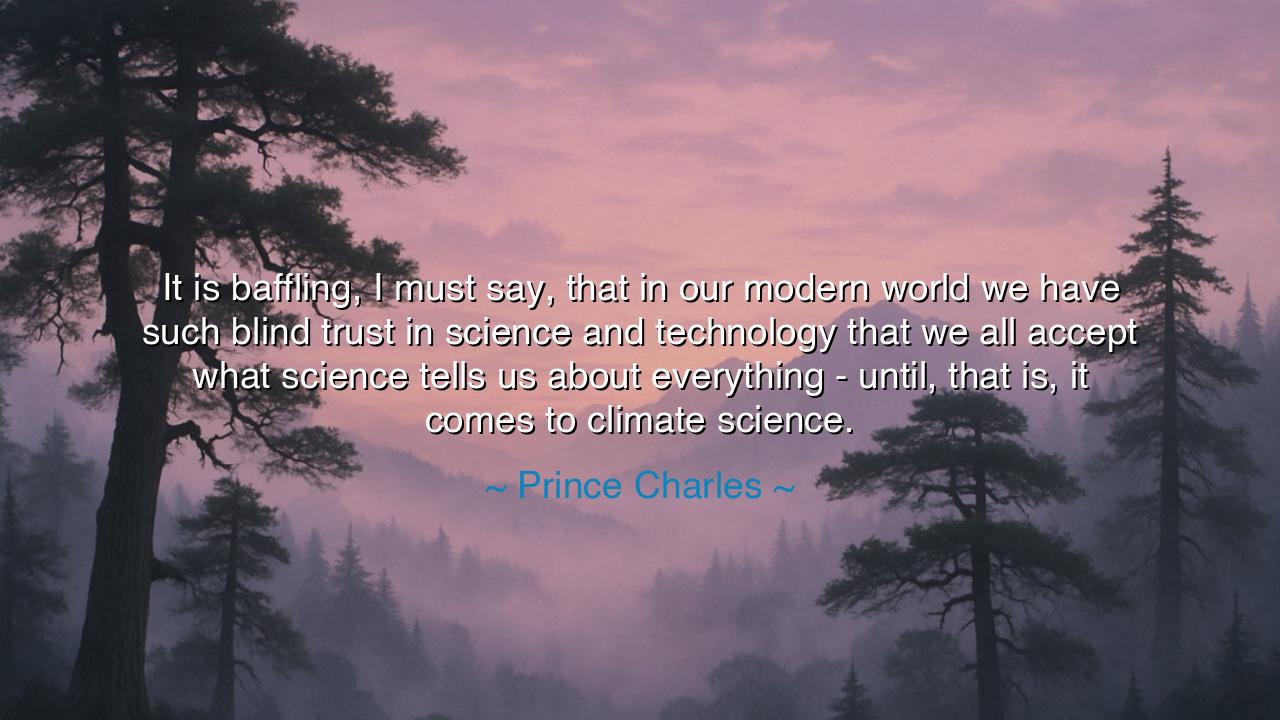
It is baffling, I must say, that in our modern world we have such
It is baffling, I must say, that in our modern world we have such blind trust in science and technology that we all accept what science tells us about everything - until, that is, it comes to climate science.






Listen carefully, O seekers of wisdom, to the thoughtful words of Prince Charles: "It is baffling, I must say, that in our modern world we have such blind trust in science and technology that we all accept what science tells us about everything—until, that is, it comes to climate science." With these words, Prince Charles draws our attention to a deep paradox of our modern age: we place great faith in the authority of science—trusting it to provide us with truths about the nature of the universe, the intricacies of medicine, and the marvels of technology—yet when it comes to climate science, the very science that warns of the destruction of our environment, we turn a blind eye. The truth that science has to offer in this case seems to be ignored or denied, even in the face of overwhelming evidence.
In the ancient world, the philosophers believed that knowledge was the path to true wisdom, and that wisdom was the foundation for living a just and prosperous life. Plato, in his writings, told us that the philosopher must be like a guardian of the truth, seeing beyond the shadows of illusion to the eternal truths that govern our world. Just as the ancient Greeks trusted in reason and the pursuit of truth through logic, so too did they understand the peril of ignoring inconvenient truths—especially when those truths pointed to the consequences of human actions on the world. Aristotle taught that humans must live in harmony with nature, for nature’s order is a reflection of the divine and the righteous path. It is in the balance of life with the natural world that truth is found, and in ignoring this, we are lost.
The contradiction that Prince Charles speaks of is not a new one. Even in Galileo’s time, the wisdom of science was resisted by those in power who wished to maintain their authority. Galileo’s observations, which revealed the true nature of the solar system, were dismissed by the church because they conflicted with established doctrines. Yet, in the end, science could not be silenced. The truths that Galileo uncovered, though resisted, eventually changed the course of human history. In the same way, the truths of climate science cannot be ignored forever. Just as Galileo’s telescope revealed the heavens, the data from climate scientists reveal the state of our planet’s health, yet we too are blind to the consequences of ignoring these revelations.
Consider, O wise ones, the story of Rachel Carson, the biologist who, through her book Silent Spring, warned the world of the dangers of pesticides, particularly DDT, and its devastating effects on the environment. Her work, though rooted in science, was initially met with skepticism and resistance from those who had vested interests in the chemicals industry. But over time, the scientific evidence she presented became undeniable, and Carson’s warnings led to the eventual ban on DDT and the rise of environmental protection efforts. The story of Rachel Carson reminds us that the truths of science are not always convenient, but they are essential to our survival. Her work exemplifies the principle that when science reveals uncomfortable truths, it is not the science that must be questioned but our own actions and assumptions.
Today, climate science faces a similar resistance, even though the data is as compelling as ever. The scientific community has presented clear evidence of the dangers posed by global warming, by rising carbon emissions, and by the devastation of ecosystems around the world. Yet, just as Prince Charles observed, many continue to deny these facts, despite the overwhelming consensus among experts. It is a baffling contradiction that we place such trust in science when it serves our immediate needs but turn away when it reveals uncomfortable truths about the world we are destroying. It is as though we are too afraid to face the consequences of our actions, too unwilling to confront the harm we are causing to the Earth.
The lesson, O seekers, is one of responsibility and action. Science is not an arbitrary collection of facts, but a means of uncovering the truths that guide our lives and our world. When science speaks, particularly in matters of life and death—such as the health of our planet—we must listen. We must face the uncomfortable truths and take responsibility for our role in shaping the future of Earth. Just as Galileo’s revelations led to revolutionary change, so too must climate science lead us to a new way of thinking and living, a way that honors the natural world and seeks to preserve it for generations to come.
Thus, let us walk forward with this wisdom: science is a gift, a powerful tool for uncovering the truth of the world, even when those truths are hard to accept. We must no longer turn a blind eye to the warnings of climate scientists. The future of our planet rests on our willingness to listen to the truth and to act in accordance with the knowledge we have. Let us heed the lessons of history, from Galileo to Carson, and recognize that when science speaks, it is not just knowledge we gain, but the opportunity for change, for growth, and for redemption. The path forward requires not just awareness, but action—a commitment to a future where humanity lives in harmony with the Earth, and where we are willing to face the consequences of our choices with courage and responsibility.






AAdministratorAdministrator
Welcome, honored guests. Please leave a comment, we will respond soon